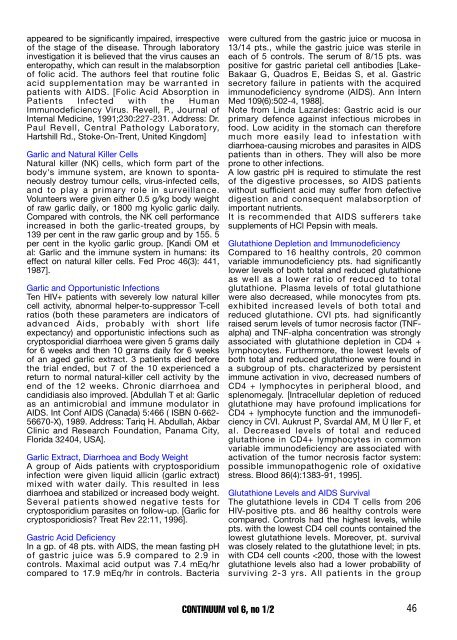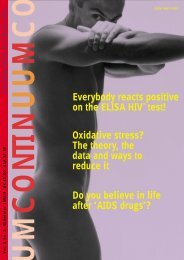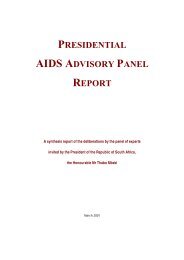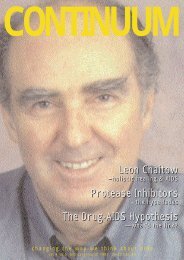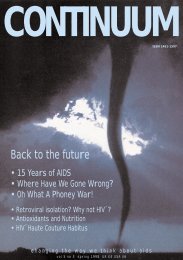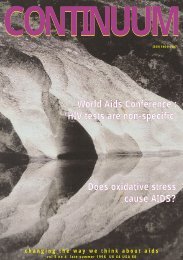AIDS post-HIV : beat of a different drummer - AltHeal
AIDS post-HIV : beat of a different drummer - AltHeal
AIDS post-HIV : beat of a different drummer - AltHeal
You also want an ePaper? Increase the reach of your titles
YUMPU automatically turns print PDFs into web optimized ePapers that Google loves.
appeared to be significantly impaired, irrespective<br />
<strong>of</strong> the stage <strong>of</strong> the disease. Through laboratory<br />
investigation it is believed that the virus causes an<br />
enteropathy, which can result in the malabsorption<br />
<strong>of</strong> folic acid. The authors feel that routine folic<br />
acid supplementation may be warranted in<br />
patients with <strong>AIDS</strong>. [Folic Acid Absorption in<br />
Patients Infected with the Human<br />
Immunodeficiency Virus. Revell, P., Journal <strong>of</strong><br />
Internal Medicine, 1991;230:227-231. Address: Dr.<br />
Paul Revell, Central Pathology Laboratory,<br />
Hartshill Rd., Stoke-On-Trent, United Kingdom]<br />
Garlic and Natural Killer Cells<br />
Natural killer (NK) cells, which form part <strong>of</strong> the<br />
body's immune system, are known to spontaneously<br />
destroy tumour cells, virus-infected cells,<br />
and to play a primary role in surveillance.<br />
Volunteers were given either 0.5 g/kg body weight<br />
<strong>of</strong> raw garlic daily, or 1800 mg kyolic garlic daily.<br />
Compared with controls, the NK cell performance<br />
i n c reased in both the garlic-treated groups, by<br />
139 per cent in the raw garlic group and by 155. 5<br />
per cent in the kyolic garlic group. [Kandi OM et<br />
al: Garlic and the immune system in humans: its<br />
effect on natural killer cells. Fed Proc 46(3): 441,<br />
1987].<br />
Garlic and Opportunistic Infections<br />
Ten <strong>HIV</strong>+ patients with severely low natural killer<br />
cell activity, abnormal helper- t o - s u p p ressor T- c e l l<br />
ratios (both these parameters are indicators <strong>of</strong><br />
advanced Aids, probably with short life<br />
expectancy) and opportunistic infections such as<br />
cryptosporidial diarrhoea were given 5 grams daily<br />
for 6 weeks and then 10 grams daily for 6 weeks<br />
<strong>of</strong> an aged garlic extract. 3 patients died before<br />
the trial ended, but 7 <strong>of</strong> the 10 experienced a<br />
re t u rn to normal natural-killer cell activity by the<br />
end <strong>of</strong> the 12 weeks. Chronic diarrhoea and<br />
candidiasis also improved. [Abdullah T et al: Garlic<br />
as an antimicrobial and immune modulator in<br />
<strong>AIDS</strong>. Int Conf <strong>AIDS</strong> (Canada) 5:466 ( ISBN 0-662-<br />
56670-X), 1989. Address: Tariq H. Abdullah, Akbar<br />
Clinic and Research Foundation, Panama City,<br />
Florida 32404, USA].<br />
Garlic Extract, Diarrhoea and Body Weight<br />
A group <strong>of</strong> Aids patients with cryptosporidium<br />
infection were given liquid allicin (garlic extract)<br />
mixed with water daily. This resulted in less<br />
diarrhoea and stabilized or increased body weight.<br />
Several patients showed negative tests for<br />
cryptosporidium parasites on follow-up. [Garlic for<br />
cryptosporidiosis Treat Rev 22:11, 1996].<br />
Gastric Acid Deficiency<br />
In a gp. <strong>of</strong> 48 pts. with <strong>AIDS</strong>, the mean fasting pH<br />
<strong>of</strong> gastric juice was 5.9 compared to 2.9 in<br />
c o n t rols. Maximal acid output was 7.4 mEq/hr<br />
c o m p a red to 17.9 mEq/hr in controls. Bacteria<br />
were cultured from the gastric juice or mucosa in<br />
13/14 pts., while the gastric juice was sterile in<br />
each <strong>of</strong> 5 controls. The serum <strong>of</strong> 8/15 pts. was<br />
positive for gastric parietal cell antibodies [Lake-<br />
Bakaar G, Quadros E, Beidas S, et al. Gastric<br />
s e c retory failure in patients with the acquire d<br />
immunodeficiency syndrome (<strong>AIDS</strong>). Ann Intern<br />
Med 109(6):502-4, 1988].<br />
Note from Linda Lazarides: Gastric acid is our<br />
primary defence against infectious microbes in<br />
food. Low acidity in the stomach can there f o re<br />
much more easily lead to infestation with<br />
diarrhoea-causing microbes and parasites in <strong>AIDS</strong><br />
patients than in others. They will also be more<br />
prone to other infections.<br />
A low gastric pH is required to stimulate the rest<br />
<strong>of</strong> the digestive processes, so <strong>AIDS</strong> patients<br />
without sufficient acid may suffer from defective<br />
digestion and consequent malabsorption <strong>of</strong><br />
important nutrients.<br />
It is recommended that <strong>AIDS</strong> suff e rers take<br />
supplements <strong>of</strong> HCl Pepsin with meals.<br />
Glutathione Depletion and Immunodeficiency<br />
C o m p a red to 16 healthy controls, 20 common<br />
variable immunodeficiency pts. had significantly<br />
lower levels <strong>of</strong> both total and reduced glutathione<br />
as well as a lower ratio <strong>of</strong> reduced to total<br />
glutathione. Plasma levels <strong>of</strong> total glutathione<br />
w e re also decreased, while monocytes from pts.<br />
exhibited increased levels <strong>of</strong> both total and<br />
reduced glutathione. CVI pts. had significantly<br />
raised serum levels <strong>of</strong> tumor necrosis factor (TNFalpha)<br />
and TNF-alpha concentration was strongly<br />
associated with glutathione depletion in CD4 +<br />
lymphocytes. Furthermore, the lowest levels <strong>of</strong><br />
both total and reduced glutathione were found in<br />
a subgroup <strong>of</strong> pts. characterized by persistent<br />
immune activation in vivo, decreased numbers <strong>of</strong><br />
CD4 + lymphocytes in peripheral blood, and<br />
s p l e n o m e g a l y. [Intracellular depletion <strong>of</strong> re d u c e d<br />
glutathione may have pr<strong>of</strong>ound implications for<br />
CD4 + lymphocyte function and the immunodeficiency<br />
in CVI. Aukrust P, Svardal AM, M Ú ller F, et<br />
al. Decreased levels <strong>of</strong> total and re d u c e d<br />
glutathione in CD4+ lymphocytes in common<br />
variable immunodeficiency are associated with<br />
activation <strong>of</strong> the tumor necrosis factor system:<br />
possible immunopathogenic role <strong>of</strong> oxidative<br />
stress. Blood 86(4):1383-91, 1995].<br />
Glutathione Levels and <strong>AIDS</strong> Survival<br />
The glutathione levels in CD4 T cells from 206<br />
H I V-positive pts. and 86 healthy controls were<br />
compared. Controls had the highest levels, while<br />
pts. with the lowest CD4 cell counts contained the<br />
lowest glutathione levels. More o v e r, pt. survival<br />
was closely related to the glutathione level; in pts.<br />
with CD4 cell counts


